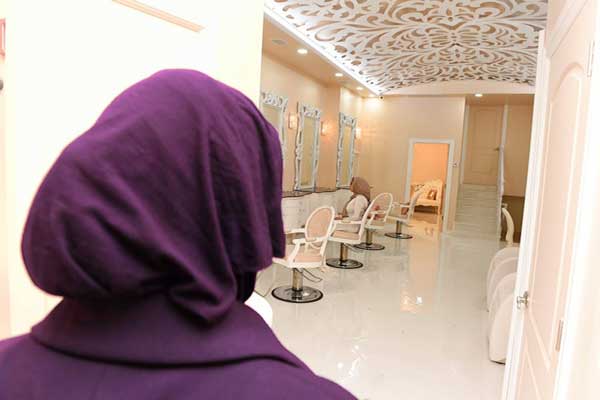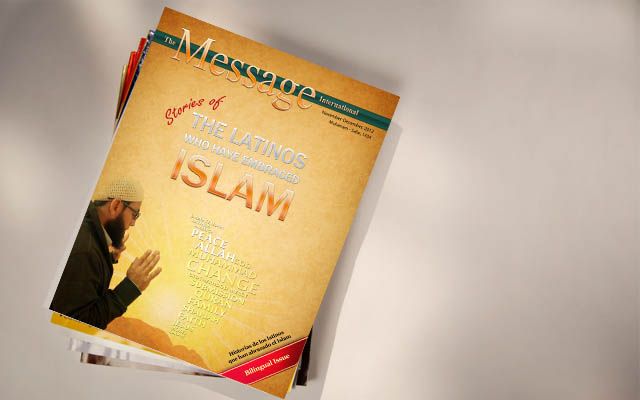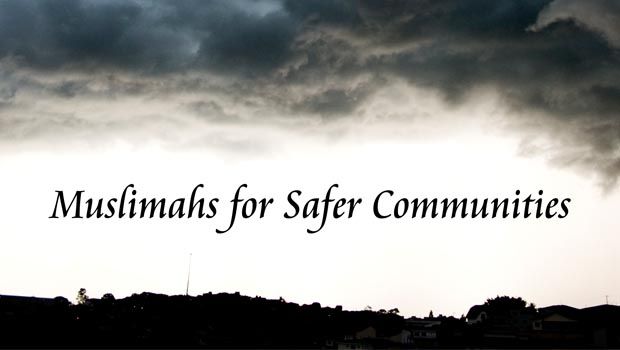Smiling in pleasant anticipation, I entered the tiny hair salon on the bustling street corner in Fez. The sign above the door proclaimed “For women only” in Arabic and French. What a treat to be able to let my hair down, literally and figuratively, knowing that men wouldn’t enter the shop! Having my hair styled in a proper salon was one of those small but significant luxuries of visiting my husband’s homeland, Morocco.
As an American Muslim who wears a khimar, I’ve had to find creative ways to get my hair cut in the States. Since almost every mainstream salon here is accessible to males and females, I can’t just walk in, remove my scarf, and relax. When I’m unable to locate or afford a stylist who makes house calls, I tend to go to mainstream establishments and ask if they have a room in the back that offers privacy. Most don’t offer secluded styling areas, but over the years some helpful, bemused staff members have found creative ways to accommodate me. As a result, I’ve had my hair cut in stuffy employee break rooms amongst half-eaten sandwiches and even in janitors’ closets surrounded by mops and brooms!
But here I was in Morocco where Islamic traditions were understood and honored. This salon’s only customers were women, and the stylists were female too. Sitting in the bright main area in a comfortable chair, I unwrapped my hijab fearlessly and felt a wave of gratitude as my hairdresser said, “Bismillah” before she started snipping. Ahh! I thought, This is how a haircut should be!
These Were My Sisters in Faith
While the stylist herself did not wear khimar, and neither did the other women around us, they were my sisters in Islam. They were fascinated by me because I was clearly a foreigner but also a Muslim, so I was both strange and familiar to them. Through my translator (my husband’s sweet cousin who had accompanied me), the staff and customers peppered me with questions: “How long have you been a Muslim?” “What do you think of Morocco?” “Is it hard to wear hijab in the United States?” They nodded towards my teenage daughter, who was with me, and inquired, “She wears hijab, too? Even in America? Willingly?”
When my stylist had finished cutting, brushing, and blow drying my hair, the onlookers gave their warm approval. She had done an excellent job. I thanked her and began to put my scarf back on.
“Noooo!” chorused all the women around me, “You’ll mess up your hairdo!”
“But I’m leaving now,” I explained. “I have to cover it.”
“Don’t cover it too much, then,” my stylist advised. “Just wrap the scarf loosely so you don’t ruin
the style.”
She attempted to arrange it for me, with the result that half of my hair was showing. The women nodded their approval. “Thank you for your hard work,” I replied through my translator, “I really like the hairstyle. But for me, hijab needs to be 100 percent.”I wrapped the scarf snugly and got up to leave. Then one of the women fired a final, lethal shot. I hadn’t seen it coming — not there in Morocco surrounded by my sisters in faith. I guess that’s why it hurt so much.“But you look so much younger and prettier without it!”
Now, I’m aware that those same words have been said to countless women who cover their hair and bodies for the sake of Allah SWT. I don’t pretend to be the only one who has dealt with this situation. It seems to be a favorite test of the Shaytan, who knows our weaknesses and seeks to exploit them through the poisonous words of people around us. When uttered by non-Muslims, those words are hurtful. But when they are said by our sisters in faith, they sting even more.
I believe there are some Muslim women who are so self-confident that they don’t need anyone’s validation of their beauty, physical or otherwise. No petty, biting words can pierce their innate sense of worthiness and dignity. Their relationship with Allah SWT is so strong they don’t doubt their inherent value for a second. Sadly, I think those self-confident women are few and far between. Most of us have grown up believing that others’ opinions determine our beauty. Deep down, many of us have bought into the lie that our physical appearance is more important than our inner light.
Therefore, when someone says we look younger and prettier without hijab, most of us immediately deduce that we look old and ugly with it. High-minded as we try to be, few of us desire to look old and ugly. This fear and insecurity can make us start to question or even resent our modest Islamic attire.
I might have wallowed in my own feelings of resentment and self-doubt in that moment, but I was more focused on my teenage daughter, who had been listening to the whole conversation. Through the salon mirror, I could see her reflection. She was clearly filled with fury on my behalf. Her face had turned red and she was fighting back angry tears. She, too, had been told by non-Muslim friends that she looked “so much prettier” without her hijab. For a teenager in a non-Muslim environment, in this age of filtered, flawless selfies and the glorification of exhibitionism, the concept of not being pretty enough can be devastating. And here her mother was being told the same thing by adult Muslim women who should know better! No wonder my daughter was upset.
With Hindsight, Distance, and Perspective
Instead of coming up with a clever reply to the commenter, I focused my energies on consoling my daughter and getting out of the salon as quickly as possible. As we walked home, I’ll admit I felt deflated. Half an hour before I had been feeling pampered and safe amongst sisters, but I now felt diminished and even foolish, somehow, although I had done nothing wrong. The thrill of a new hairstyle was gone. I found myself wondering exactly how old and unattractive I looked with my hijab and contemplating how much nicer it felt to be praised and showered with compliments. Then I pondered why strangers’ opinions mattered so much to me and whether that made me a weak Muslim. All of this inner turmoil — plus my daughter’s indignation — were caused by people who should have been supporters.
If I were able to go back in time, now that I have the benefits of hindsight, distance, and perspective, I would have said to the sisters in the salon, “You have chosen not to prioritize hijab, and that is between you and Allah SWT. But what if your offhand words to me, perhaps unintended, preyed on my insecurities so much that I decided to remove hijab permanently? Would you want that on your conscience on Judgement Day? When Allah SWT asks you what you did to help your sisters in faith, will you be able to say you encouraged them to practice their faith courageously and fully? As a convert to Islam, I might be particularly susceptible to the opinions of ‘born Muslims.’ Do you really want to admit to Allah SWT that instead of advising me to strive to please Him, you enticed me to disobey Him? To doubt my worth and question my priorities? To believe that my physical attractiveness was more important than my integrity? Please, sisters, we all need to think before we speak. The Messenger of Allah, peace and blessings be upon him, said, ‘Most of the sins of the children of Adam are on their tongues’” (al-Tabarani).
To myself and my daughter I would say, “Don’t grieve over those hurtful words. Thank Allah for this test because it will only strengthen you. Never, ever prioritize people over your Creator. Never seek their approval more than His. Remember that no matter what you do, many people will not be pleased. Even if you put all of your effort into beautifying yourself with the perfect hair, makeup, physique, and clothing and display all of it to the world, they will still find fault. Some people are insecure, some jealous, some shallow, and some misguided. You are not the problem, and neither is your hijab. If you seek to please Allah SWT you will always win. Do not resent the people who put your faith to the test. Make dua’a for them, identify the lesson buried in the sting, and march forward, away from caring about the approval of others, always with your eyes on the prize: Paradise.”
Having recounted this story, I would like to add that a number of remarkable Moroccan women were among those who inspired me to become Muslim in the first place. My sister-in-law is an exceptionally bright, capable, and strong mother, wife and professional. When I first met her, she told me with unmistakable passion and sincerity that she loved Islam and loved her hijab and would never give them up, insha’Allah. Her words and conviction impressed me profoundly. My mother-in-law is the most patient, sincere, and gentle person I’ve ever met, masha’Allah. She is a walking example of reliance on Allah SWT and trust in His plan. My husband’s Moroccan family, in general, welcomed me warmly before I became a Muslim, supported and loved me unconditionally, and later celebrated my conversion. I know Allah SWT has seen all of their contributions to my growth and that He SWT will reward them, insha’Allah.
Words are powerful and we must choose them carefully. We all have the potential to support one another and enjoin each other to good, or to disparage, harm, or even mislead. Let us choose wisely, knowing that one day we will answer for our decisions.






